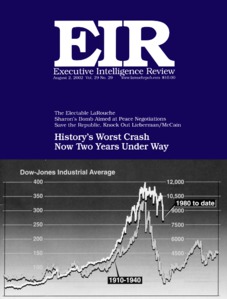Cover
Two Years Into theWorst Financial Crash in History
by John Hoefle
Stock markets are down some 50% from their peaks in 2000, back to their 1997-98 levels, but carrying half a decade’s more debt, leverage, and speculation. How far and how fast we fall, is largely a matter of actions taken, or not taken, on fundamental economic policy. The future of mankind depends on those people who respond to the crisis by reexamining the axioms which caused them to be deluded, and by figuring out why Lyndon LaRouche could see so clearly, what they did not.
Economics
The Usefulness of Nepad for Africa
by David Cherry
The New Partnership for Africa’s Development (Nepad), a plan of African Presidents to get aid and investment from the developed countries, in exchange for policies of privatization, austerity, and political good behavior, has done negative service of raising for African debate, the vital alternative: industrialization.
Italian Senator Shows Worldwide Plight of Pension Funds
by Sen. Oskar Peterlini
Speech to an EIR seminar in Rome on July 2.
Wall Street Takes a Hit in Peru, As Anti-Privatization Spreads
by Valerie Rush
Drug Shortages Plague United States
by Linda Everett
Part 1 of a series on “The Other Security Risk.”
National Food Self-Sufficiency Planning: The Case of Malaysia
An interview with Mohd Peter Davis.
International
Sharon Orders a Massacre and Prepares for War
by Dean Andromidas
The Israeli Prime Minister, backed by Labor Party members of his Cabinet including Foreign Minister Shimon Peres, ordered the bombing in Gaza precisely at the point that strenuous international efforts had nearly organized a cease-fire.
If U.S. Patriots Defeat the Tory Faction, We Can Stop the Drive to War
by Lyndon H. LaRouche, Jr.
Iran’s IRIB Radio interviews Lyndon H. LaRouche.
Sharon’s Collective Punishment: A War Crime
by Dean Andromidas
‘Regime Change’ in Iraq Begins in Turkey
by Muriel Mirak-Weissbach
Dark Attacks Against LaRouche in Germany
by Alexander Hartmann
U.A.E.’s Economic Humanism Builds a Modern Nation
by Muriel Mirak-Weissbach
Mexico in Crosshairs of Human Rights ‘Mafia’
by Rubén Cota Meza
LaRouche Interviewed: U.S. Like Roman Empire
by Lyndon H. LaRouche, Jr.
From an interview with the Russian weekly newspaper Vek.
The Murky Dismissal of German Defense Minister
by Rainer Apel
Schisis in Putin’s Russia
by Roman Bessonov
Roman Bessonov explores the impact on Russia’s elites of years of mental splits, which have created susceptibility to geopolitical entrapment.
Books
Islam: Bernard Lewis’ Lie, Abdessalam Yassine’s Truth
by David Cherry
What Went Wrong? Western Impact and Middle Eastern Response, by Bernard Lewis, and Winning the Modern World for Islam, by Abdessalam Yassine.
Russia at the Launch of the Great Game
by Mary Burdman
Diplomacy and Murder in Tehran: Alexander Griboyedov and Imperial Russia’s Mission to the Shah of Persia, by Laurence Kelly.
Departments
International Intelligence
Editorial
The Big Crash: Substance and Shadows.
Interviews
Mohd Peter Davis
A British-born Lecturer in the faculty of Veterinary Medicine, Universiti Putra Malaysia, Selangor, Malaysia, Mr. Davis studied biochemistry in Britain, worked in animal husbandry in Australia, and has been active for many years in R&D for Malaysian agriculture.
National
Knock Out Lieberman and McCain To Save the Republic
by Jeffrey Steinberg
Beyond the well-known weaknesses of President George W. Bush and his immediate circle of Presidential advisers, the greatest obstacle to effective leadership from the institution of the U.S. Presidency, is the insurgency against the Bush Presidency, led by Senators Joseph Lieberman (D-Conn.) and John McCain (R-Ariz.).
The Electable LaRouche
by Lyndon H. LaRouche, Jr.
“Some people who ought to know better, exclaim, ‘But, LaRouche is not electable!’ Do not become upset when you hear such foolish things being said. When people say that, they are not actually thinking; it is just another case of a mouth shooting itself off in a knee-jerk, Pavlovian reflex.”
‘Homeland Security’ Threatens Constitution
by Michele Steinberg
At a seminar held in Washington by the Coalition on Defending American Constitutional Rights and Liberties and the Founders’ Views of Mankind, speakers did not toe the “inside the Beltway” line.
Ritter Debunks Iraq War Hype in London
by Mark Burdman
Former UN weapons inspector Scott Ritter spoke before a cross-party group of British parliamentarians.
Congressional Closeup
by Carl Osgood



